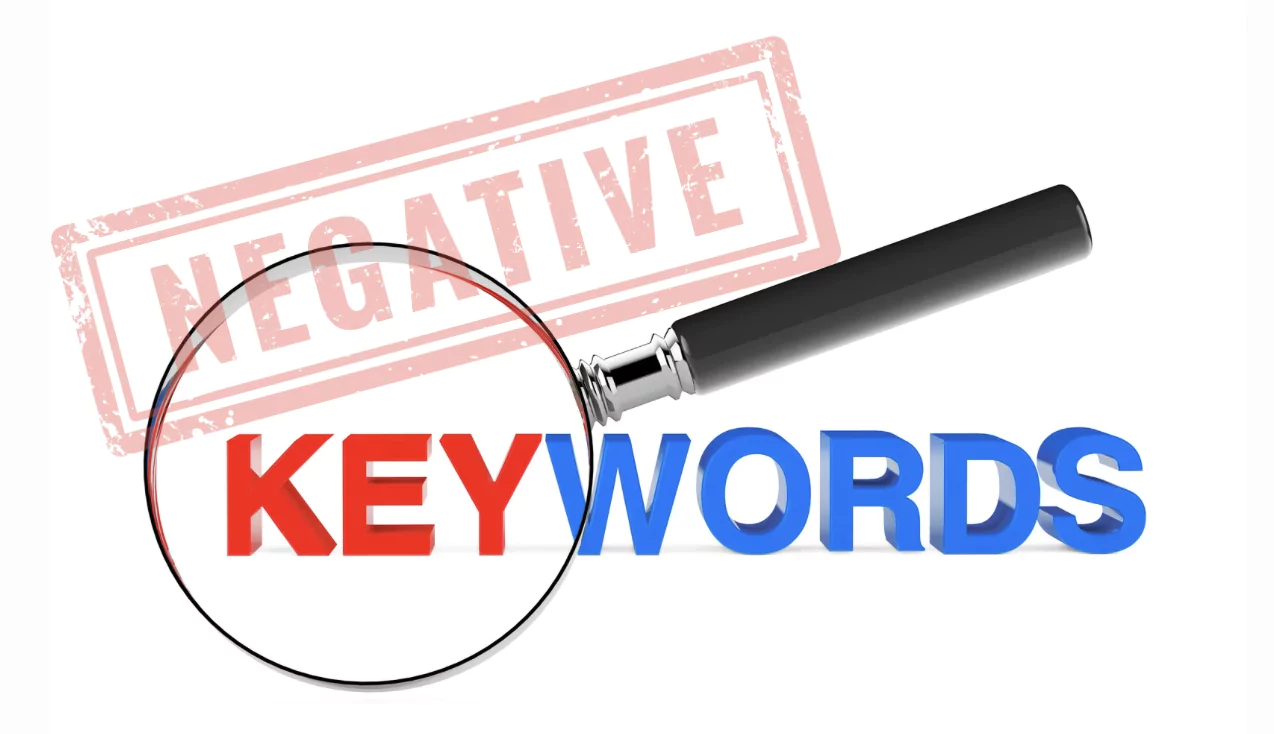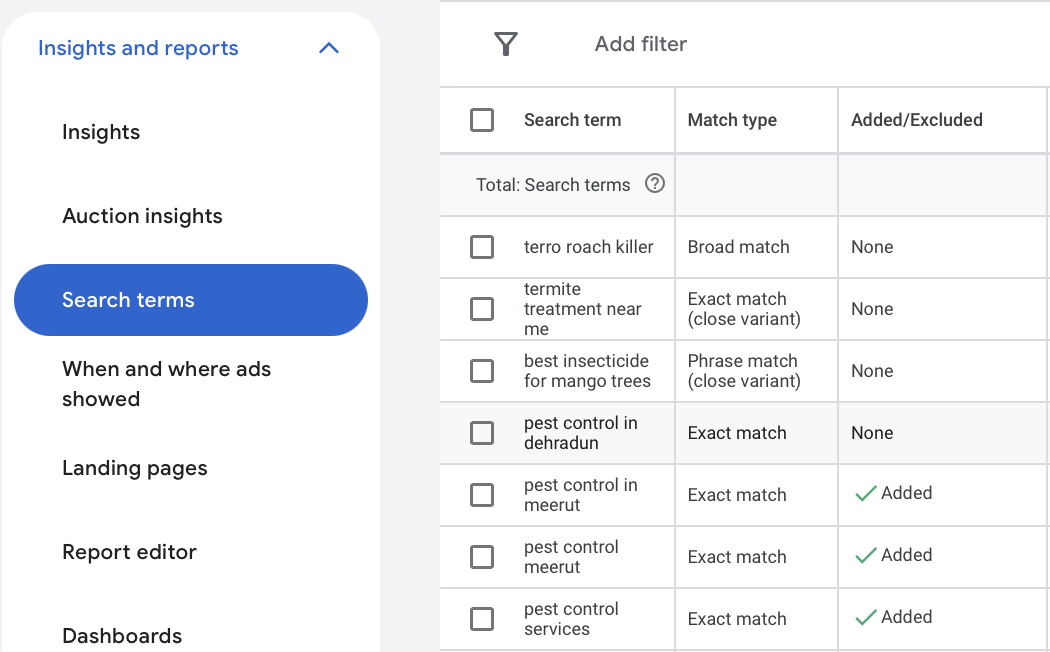Negative keywords are something we use in ads to prevent certain queries from triggering certain ads, which you do not want to be seen for as they are irrelevant to your business objective. You can observe negative keyword listing in a well-planned SEO strategy or digital marketing plan to increase brand awareness and lead collection for the company.
In order to run a successful ad campaign, you need to add relevant keywords and omit keywords you do not need. Here, we will learn more about negative keywords in detail.
What Are Negative Keywords?
Negative Keywords are the phrases that you avoid in your content. These keywords keep your ads from appearing to users whom you are not targeting, as appearing at those places might reach the wrong customer or lower the brand value.

It is particularly the words or phrases you choose that keep your ads from appearing in the search result pages. This filters out any irrelevant terms for which you do not want to rank.
- Negative keywords are phrases mainly used in Pay-Per-Click (PPC) campaigns.
- The main objective of Negative keyword labeling is to prevent ads from appearing on irrelevant target audiences, sites, search results, etc.
- For example, PW Skills, while promoting its online digital marketing course, can mention keywords like cheap as a negative keyword.
- This practice can prevent your ad budget from appearing when people search for irrelevant terms or phrases.
Why Are Negative Keywords Important?
Negative keywords are bad, but if used strategically, they can help your ads find the right customers while protecting your brand image and value.
- Keeping negative keywords in consideration can save your ad spend and prevent wastage.
- When you limit negative keywords, you filter irrelevant terms from getting shown to people, which might lower the quality or value of a brand.
- With negative keyword targeting, you avoid the wrong customers from reaching your site with wrong expectations.
- When your brand appears alongside terms like “cheap,” then it might flag a negative perception of the brand. You can avoid this situation by listing negative keywords so that people do not associate your products or services with the wrong phrases or contexts.
Read More: What are Seed Keywords With Examples | How To Find Seed Keywords In 2025?
Types of Negative Keywords
Multiple types of negative keywords need to be taken into consideration while planning a campaign. Let us check some major types below.
1. Negative Broad Match Keywords
These keywords do not have surrounding punctuation, which means when you add a negative keyword, your ad won’t appear if a search query on search pages contains negative keywords in any order i,e. Suffix or prefix.
For example, suppose your negative keyword is “free course,” so your ad won’t appear for the best free digital marketing course, but it might still show for “ free SEO” as “course” in the negative keyword is missing from the phrase here.
2. Negative Phrase Match
This phrase match gets activated when an exact phrase in the same order appears in the search query. There can be extra words before or after the phrase. For example, you listed “digital marketing jobs” as a negative keyword, as you don’t provide job services. Your ad won’t show for “digital marketing jobs near me” as the negative keywords appear in the same order. But your ad may still show up for keywords like “jobs in digital marketing courses” as here negative keywords are listed in a different order.
3. Negative Exact Match
With this type of negative keyword, your ad will only be restricted when there is an exact phrase match with no extra words.
For example, when your negative keyword is “digital marketing pdf,” then your ad won’t show for “digital marketing pdf,” but it still might show for “digital marketing pdf free download. There are many changes based on how crawlers crawl data on a site, and hence you need to take synonyms, misspellings, variations, singular or plural versions into consideration. So when you exclude a keyword, it is fair to exclude variations of these negative keywords too.
Read More: What Is Keyword Intent? An Overview & How To Identify It
How Can You Identify Negative Keyword Research?
There are certain things you will need to extract negative keywords and include in your strategy
1. Google Keyword Planner

You can check all the queries, including terms and phrases that are visible in your ad campaign. Pick any of the irrelevant words in a list that is not useful for the objective of the company and might not give any meaningful conversions or clicks.
- Go to “Google Ads”, click on “Campaigns”
- Now, search for “Insights and Reports → Search terms”
- You can choose the keyword for which you want to see the search query.
- Now you can pick out the negative keywords and add them to an existing list or a new negative keyword list.
2. Google Search Console

You can also check the “Queries” section in the “Search Result” tab of Google Search Console to find the queries for which your webpage appeared. You can filter out the keywords irrelevant and not beneficial for the organisation and add them to the filtered negative keyword list.
3. Google Ads platform
You can check the reports provided on PPC platforms with details on the actual terms or phrases searched in the search engine before interacting with your ads. You can identify the negative keywords from the list and add them to your list.
4. Competitor analysis
You can find negative keywords on your competitor’s site. All you need to do is look for keywords that might be irrelevant from the business point of view, and you can exclude these keywords in your ad campaign to reduce ad budget loss.
5. Study Feedback
Often, feedback forms or surveys help you understand users’ points of view and understand whether or not your users are getting to you using the right keyword. For example, a student posted feedback that I did not get an internship, even though it was guaranteed in the program.
However, your program does not say anything about an internship guarantee. Hence, you can find and list these query phrases in an ad campaign.
Steps to Add a Negative Keyword To Google Ads
After you are finished preparing your negative keyword list, you can add negative keywords to Google Ads. Follow these simple steps given below.
- Go to the campaign icon section on Google Ads
- Select Audiences, content, and keywords in the dropdown menu.
- You have to search for the keywords section.
- Now, go to the Negative search keywords tab and click on the add (+) button.
- Now drop your negative keywords list here and select the check mark on the box to use.
- Click on the “Save” button.
Read More: What Are Branded Keywords? 11 Smart Ways To Use Them
Benefits of Using Negative Keywords In an Ad Campaign
Some of the major benefits of using negative keywords are mentioned below.
1. Reduced Ads Waste
Negative keywords eliminate irrelevant searches on the site, which saves ad budget on irrelevant phrases and increases conversion rate as well as Click Through Rate (CTR).
2. Improve Targeting
With negative keywords, you get more relevant users on your site, which means targeting people who might actually be interested in your product or services.
3. Boost Click Through Rate (CTR)
Your ads get shown to the relevant audience when you eliminate irrelevant impressions. When there are fewer irrelevant impressions, it leads to higher CTR.
4. Increase Conversion Rate
When your ads reach the right audience, probably interested in the type of service or product your business provides, the chances of conversion increase.
5. Better ROI (Return On Investment)
Every penny spent on running an ad campaign is used to get visibility on useful places and infront of the right audience. Eliminating irrelevant queries helps you save money while improving your conversions.
Become a Pro in Digital Marketing With PW Skills
Build your career in Digital Marketing with an AI powered Digital Marketing Course offered by PW Skills. This course is suitable for newcomers, self learners, and business owners looking for digital growth of their business and building online presence.
Get in demand skills designed for today’s AI driven landscape with optimised SEO, social media strategy, content creation, analytics and more to build your career in digital marketing.
Looking for More?
- Get industry led live sessions with professionals in digital marketing
- Build a fully job optimised project portfolio which demonstrates your skills, and strengthens with projects.
- Get opportunities for full time jobs or freelance clients for different digital marketing tasks.
- Get personalised career assistance to prepare for interviews and land your dream job
- Get industry recognised certifications from PW Skills
- Enhance your job readiness with practical skills and expert career guidance.
Negative keywords FAQs
Q1. What are Negative Keywords?
Ans: Negative Keywords are the phrases that you avoid in your content. These keywords keep your ads from appearing to users whom you are not targeting.
Q2. Why are negative keywords important?
Ans: Negative keywords help in increasing conversion rate and relevance of ad groups by removing irrelevant terms. They help you get more relevant users to your site.
Q3. How to find Negative keywords?
Ans: You can find negative keywords on the Google Ads platform or Google Keyword Planner. Check the queries your ads get triggered for and grab the keywords in a list that you find irrelevant to your business goals.
Q4. What are the types of negative keywords?
Ans: Negative broad match, Negative phrase match, and Negative Exact match are three major classifications of negative keywords.


